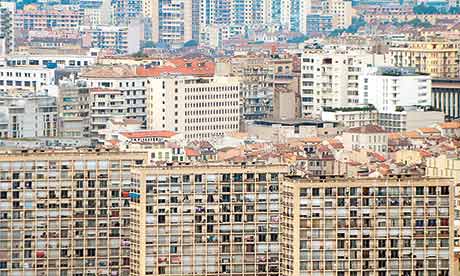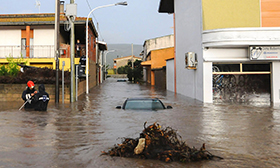In 1957, when it was first built, the population was soaring so there was no time to lose thinking of new names: it was just known as the Lycée Nord. On the hills to the north of Marseille, tower blocks were popping up like mushrooms, as housing for industrial workers and their immigrant reinforcements. Subsequently renamed after the writer Saint-Exupéry, it is still the only school in the poorest quarter of the city preparing students aged 15 and older for the baccalauréat and a range of technical qualifications.
The main building, which is 350 metres long, overlooks Port de l'Estaque. In 2008 a new wing – all glass and concrete – was added. The lycée backs on to grassland, dotted with maritime pines, where the students can stroll. Le Monde visited on a Thursday, almost at the end of the school year, coinciding with a party for the top year. Several young women were inflating balloons. "It's nice here," they exclaim, with the characteristic Marseille twang. The college seems like an oasis of tranquillity, surrounded by "problem" estates. Just up the road the tower blocks of Consolat-Mirabeau are the source of regular incursions into the car park, despite the fence. To the south Campagne-Lévêque is just recovering after a month's occupation by the police to stop various forms of trafficking.
Despite the summer weather, the cicadas and the smell of rock roses, what is striking is the imprint of poverty and violence. For the past 20 years the area has been gripped by unemployment and its attendant woes: increasingly casual employment, single-parent families, pensioners living behind bolted doors, single women struggling to make ends meet. The past two years have made things even worse: "There are things we didn't see before, like the dustbins being picked over every day, organised prostitution and youth suicides," says Patricia Bonin, a member of the parent-teacher association.
Drug-dealing has taken root and delinquency is worse, with recurrent incidents at the lycée. On 30 May 10 parked cars were vandalised despite the CCTV cameras. The next day a video projector was stolen from a classroom, the 21st theft of this sort since September last. "Over the weekend I spend my time running around with the security man to stop people getting in. It's a pain," says the school's head, Olivier Briard. He adds, though, that the previous year he had to cope with a shootout in front of the college and a student suicide. "The lycée didn't use to have any major problems, but gradually with the deepening crisis and 'ghettoisation' of the neighbourhood, our intake has changed," Briard explains. "It's not the same at all," says maths teacher Farid Messaoudi, who grew up nearby.
Mention of the "ghetto lycée" does not go down well in the staffroom. But the facts and figures all endorse that view. Students come from nine neighbouring secondary schools. The worry is that a great many of their fellows go elsewhere, either to private schools or to lycées in other parts of the city. Families that can afford it will go to great lengths to enrol their children elsewhere. "The ones who come here have no other option: with a working-class background there are no strings to pull," says Franck Baillot, a former teacher. But, after losing a lot of pupils in 2004-10 the intake is picking up: with the economic downturn parents can no longer afford private fees.
Teaching at Lycée Saint-Exupéry is a bit different from elsewhere, to say the least. However as part of an "educational success network", it has a special class preparing students for the entrance exam to HEC, France's top business school, and another for prospective nurses. The baccalauréat success rate has significantly improved recently, "but it's still very low," Briard says. The standard in classes is fairly even, but at the low end, teachers note. They review teaching methods every year, in a constant drive to consolidate learning. Disciplinary issues are no worse than elsewhere, but students often lack the necessary grounding to cope with the curriculum.
With the teaching itself, counselling, meetings and work with vocational advisers, it all adds up to a longer working day than in the average lycée. The number of applications for transfers reflects the strain many endure. "And when you come out of school and find your car's been pelted with stones, it's hard to swallow," says Pascal Faure, a union rep. Teachers are awarded an extra €90 ($120) a month, a pittance. "In neighbourhoods like this we really need some recognition of the specific challenges teachers face and greater career rewards," says Marina Turin, tasked with priority sectors at the regional education authority.
At the same time, everyone is convinced that if the lycée has so far survived it is because the teaching staff stick together more than elsewhere. "We may be exhausted, but our secret is our collective response," Briard claims. And "when a student slams the door as they storm out of a classroom, there's always the sea to ease the tension."
This article appeared in Guardian Weekly, which incorporates material from Le Monde





















